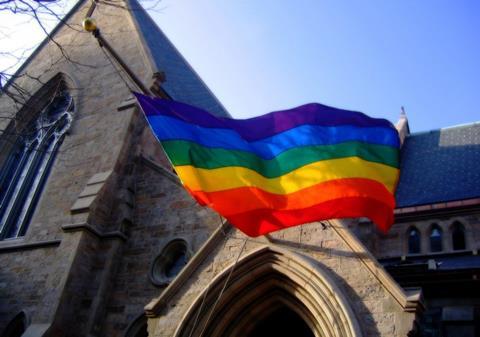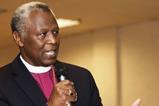The debate over same-sex marriage and prayers of blessing continue in the Church of England. Tim Wyatt explains what’s being proposed at the upcoming General Synod and what it might mean for Anglicans

The Church of England will soon approve new prayers of blessing for gay couples, its leading bishops have announced.
Despite a major conservative backlash since the plans were first unveiled in February, the CofE will mostly press ahead with its plan to allow vicars to formally bless gay relationships in church for the first time. But they have inched back from parts of their initial proposals in the face of legal threats, which has equally infuriated liberals.
How did this all start?
Since 2017, the CofE has been engaged in a project called Living in Love and Faith (LLF). This has been a wide-ranging research and consultation project examining marriage, sexuality, identity and relationships. After more than five years of theological study and debate, the LLF process culminated in the House of Bishops – representing the CofE’s 50 or so most senior bishops – proposing the idea of blessing gay relationships in church.
The bishops said they did not want to change the Church’s official doctrine on marriage, which would remain that it is only for heterosexual couples, but did want to recognise and affirm loving and committed same-sex relationships in formal church services. They produced a draft set of liturgies and prayers, known as the Prayers of Love and Faith (PLF), and presented them to the General Synod, the Church’s governing body, in February this year.
After a long debate, the synod voted to go ahead with the plan, although there was an amendment also passed which said the PLF could not suggest any departure from Church teaching on marriage or sexuality.
What has happened since?
Since the synod vote, evangelicals, traditionalists and conservatives have been lobbying furiously. Some large churches have stopped paying their (voluntary) financial contributions to their dioceses in protest, others have explored bringing in conservative Anglican bishops from overseas to replace their own bishops, and others have even issued veiled legal threats should the PLF be introduced.
Opponents of the PLF argued that if the Church did bless a gay couple, it would, by default, contradict current doctrine on marriage and sex
The Church’s hierarchy have attempted to soothe concerns by starting work on what is being called “pastoral reassurance” – efforts to protect the consciences of traditionalists who oppose the PLF. While the PLF remain in draft form, the bishops have said that they intended to “commend” them to the Church. This means they would be added to the suite of optional, voluntary prayers and services any vicar can choose to use. No parish would be obliged to offer gay couples any blessings or prayers.
However, conservatives argue that the Church’s constitution does not permit this. The rules state the bishops can only commend services which do not indicate any departure from Church doctrine “in any essential matter”. The commending pathway has mostly been used in recent times for new one-off services covering non-controversial issues.
But conservative opponents of the PLF argued that if the Church did bless a gay couple, who may be in a civil same-sex marriage and having sexual relations, it would, by default, contradict current doctrine on marriage and sex. Therefore, the only legal route to bring in the PLF was by the full legislative process through synod. This would involve a lengthy consultation with all 42 dioceses and several rounds of debates at synod over at least two years. At the end, the synod would need to vote in favour of the PLF by a two-thirds majority in each of its three houses (laity, clergy and bishops). While the PLF was passed by a simple majority of the whole synod in February, it did not have two-thirds support among either the clergy or the laity.
How have the bishops responded?
Since the beginning of summer, the bishops have been meeting with pressure groups on both sides The process has been mostly held behind closed doors, although there have been hints and leaks about the discussions.
Last week, a final decision was announced as part of the documents released ahead of the next synod in November. In a lengthy paper, the House of Bishops explained that they would push ahead with commending the PLF, but only for use within regular church services. The liturgies for holding a special standalone service just to bless a same-sex couple are not going to be immediately commended but will go through the full synodical legislative process. This will take until at least 2025, and given it would require a two-thirds majority vote in all three houses of the synod, it is doubtful if it will be approved.
They also said that long-awaited rules on what the PLF meant for vicars were not yet ready for discussion at synod. Currently, CofE priests are barred from entering civil same-sex marriages and can only be in a civil partnership as long as they remain celibate. Liberal activists have been lobbying intensely for these rules to be loosened and bishops had pledged to bring forward revised rules on clergy conduct alongside the PLF. However, they have now said that they need more time to finalise this guidance.
What has changed since February?
The major headline remains the same: for the first time, the CofE will permit gay couples to have their relationships blessed in church - presuming members vote in favour of the bishops’ revised plans.
However, by deciding not to commend standalone services for gay couples, the bishops have rowed back slightly. While they always argued that the PLF were not equivalent to Holy Matrimony in the eyes of the Church, the initial drafts did contain services which could look a bit like a gay wedding. Couples who had just contracted a civil same-sex marriage could immediately come to a church for a special service which could include blessing of their wedding rings and other features reminiscent of marriage. These more ‘wedding-like’ elements of the PLF have been separated out and, given the lack of a two-thirds backing among synod members, are unlikely to be introduced in the near future.
Currently, CofE priests are barred from entering civil same-sex marriages and can only be in a civil partnership as long as they remain celibate
When the PLF were first unveiled, they conspicuously made no mention of sex. Some bishops, when pressed on whether this meant the Church was abandoning its teaching that sex was only for heterosexual, married couples, said the question of whether a gay couple wanting to be blessed was sexually active was immaterial to the priest.
However, following legal advice, the bishops have conceded that the CofE is retaining its doctrine about sex, just as it is not changing its teaching on marriage. In their paper for synod, the bishops concede that it is plausible that, by blessing a gay couple who are having sex, the PLF may indicate a departure from Church doctrine on these grounds. But the bishops add that because the PLF do not intend to change marriage doctrine, but solely affirm the good in same-sex relationships which also exist in marriage (examples cited include stability, faithfulness, exclusivity and lifelong commitment) the blessings can still be commended.
“The PLF do not seek to simulate marriage, or equalise these relationships, or pretend that our Church has made a decision to extend marriage to same-sex couples,” the paper states. “But they do affirm what is good, and pray for God’s presence and blessing over the people within the relationship.”
So, how can they still commend the PLF if they do contradict doctrine?
The document introduces a new idea in Anglican theology – “pastoral provision in a time of uncertainty”. The bishops argue that it remains unclear where the CofE’s long debate over sexuality will eventually land. In the meantime, given the deep disagreement within the Church and strong desire among the liberal wing for reform, it is reasonable to introduce a moderate form of pastoral provision via the PLF for same-sex couples while we wait.
“Pastoral provision recognises that there is currently uncertainty about the outcome of the church’s discernment in relation to same-sex relationships and acknowledges a provisionality of our knowledge and responses in ways that err on the side of grace rather than judgement,” the bishops write.
“This pastoral provision would stand in a long line of the pastoral practice of finding ways to help people move forward in holiness in a world that falls far short of any ideals, without giving up on the idea of the ideal altogether.”
Therefore, they conclude that while blessing a potentially sexually active same-sex couple might indicate a departure from doctrine, it would not be a departure in “any essential matter” and therefore would still be permissible without synodical approval.
This is the first time the bishops have articulated this or, frankly, any theological rationale for what they are doing with the PLF, and how they can retain traditional marriage teaching while also blessing same-sex couples. They write that their position has come following legal advice from CofE lawyers, but many have already expressed scepticism about their plans. It remains possible that conservative groups may go ahead with a legal challenge to any parish which attempts to use the PLF after they are commended. Then, it would go to a church court where an ecclesiastical judge would determine, once and for all, if the PLF did indicate a departure from doctrine.
What has been the reaction?
The bishops’ typically fudged way forward has, predictably, upset both sides. Conservatives remain angry that gay blessings will be introduced, even if in a slightly diminished form. Liberals are enraged that standalone services are being delayed (and possibly shelved permanently) due to the need for that elusive two-thirds majority in synod. And both sides are upset that the long-awaited new rules on whether gay vicars can marry and/or have sex with their partners have not yet been published or debated.
Given the majority in favour of the PLF in February, it seems likely the simple motion brought to the synod by the bishops will be passed next month. That only asks members to “recognise the progress made by the House of Bishops towards implementing the motion on Living in Love and Faith passed by this Synod in February…and encourage the House to continue its work of implementation”.
However, the fissures exposed by February’s divisive vote will continue to grow. Liberals have the support of prominent MPs who have threatened the Church that if it does not bring forward more meaningful pro-LGBT reforms quickly, parliament may force it to via direct legislation. Ben Bradshaw, an Anglican Labour MP, has castigated church authorities for “backtracking” on what was agreed in February, saying: “Parliament expects the promises made and timetable previously outlined to be kept”.
A small group of 12 members of the House of Bishops also broke ranks and published an open letter, decrying the actions of their colleagues in trying to push the PLF through without two-thirds majorities in the synod. Further leaks from the meetings have revealed the level of disagreement among the bishops (voting figures leaked to the Church Times show the House is almost 50-50 split on key issues such as how to implement gay blessings and whether gay vicars should be allowed to marry).
Conservative factions remain entirely unmollified by the bishops moderate retreat from the initial PLF plans, and have continued discussing their options for more protest and perhaps even steps towards schism. Conversations with overseas conservative Anglican groupings have taken place, with high profile evangelical leaders such as the former HTB rector, Rev Nicky Gumbel involved.
The big demand from the Church of England Evangelical Council (CEEC) - which has been largely co-ordinating opposition to the PLF - is for some form of restructuring of the CofE. If gay blessings do become a reality, they want “orthodox” Anglicans to remain within the CofE, but at arms-length from its liberal wing. This might look like more so-called “flying bishops”, which are already used for parishes that reject women bishops and can instead ask to be placed under the oversight of a traditionalist male bishop from elsewhere. However, it may go as far as having separate bishops, synods and canon law while not formally splitting into two denominations.
Will evangelical opponents to the PLF be protected?
While the House of Bishops has so far resisted the more sweeping reforms proposed by the CEEC, they have been working on “pastoral reassurance” since February’s synod vote. Their latest document introduces elements which they argue will protect the consciences of traditionalists. No conservative vicar or parish can be forced to use any of the PLF. The guidance on the PLF also encourages any vicar wanting to use the prayers to consult with their church council and wider congregation first.
If the standalone services (which are not being immediately commended) do eventually pass the synod, they would include an opt-in system, meaning only churches which have chosen to offer them would be able to.
The document introduces a new idea in Anglican theology – “pastoral provision in a time of uncertainty”
They are also considering creating an independent reviewer who could be appealed to by churches from either side if a grievance arises over how the PLF are working out in practice, and making a formal declaration by the House of Bishops that any vicar or parish will be supported by their local bishop whether they choose to use the PLF or not.
As for the CEEC’s demands for structural reforms, they only say that they are “exploring arrangements for formal structural pastoral provisions” for parishes which believe they need “differentiation” from churches using the PLF.
Finally, bishops do concede that individual vicars using the PLF could, in theory, still be sued in church court by conservatives who argue the prayers, despite being commended by the bishops, are still unlawful under church law. Even though the bishops disagree with this position, they note it would be up the court to make the final ruling.







































No comments yet